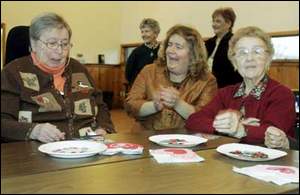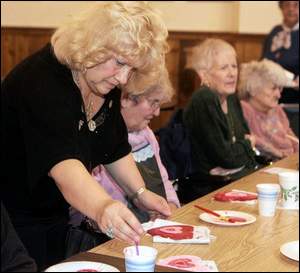Take a break
Families
find relief from caring for parents through expanding respite
programs
Home News Tribune Online 02/10/07
By RACHEL V.
KATZ
CORRESPONDENT
Once a week, Yvonne Gottlieb and her mother, Rhona Wilmot, each
get a much-needed break when Wilmot heads to St. Thomas the Apostle
Church in Old Bridge for an afternoon of socializing with other
seniors. For Gottlieb, it's an opportunity to attend to errands and
lift some of the strain that comes with caring for her 86-year-old
mother at home. For Wilmot, it's a brief return to independence and
an activity-filled afternoon.

"This
gives my mom her self-esteem back. When she comes home, she's happy
and she's relaxed," says Gottlieb, an Old Bridge resident, who
juggles work along with her roles as daughter, wife and mother of a
12-year-old son. At Interfaith Network of Care's respite program,
Wilmot enjoys lunch, works on some crafts and socializes with the
others in the group. "Somehow we can handle the stress of the
situation so much better," adds Gottlieb.
Interfaith Network's program is one of a growing number of options
to help New Jersey families caring for parents carve out some time
for themselves and lighten their load. Respite programs, which are
also available for those caring for children and adults with special
needs, provide assistance ranging from day-long activities to in-home
health aides. Last year, more than 4,200 New Jersey families received
some assistance through the Department of Health and Senior Services'
Statewide Respite Program.
Once focused on short-term situations, respite programs are
becoming more important as the population ages and more adults find
themselves taking care of their parents on a long-term basis. The
state's program has increasingly sought to offer flexible
alternatives to address the growing need, said Pat Polansky,
assistant commissioner of the New Jersey Division of Aging and
Community Services.
More choices
The state offers several options, including the statewide respite
program administered through the counties and an Alzheimer's adult
day services program. More recently, the state began piloting a
program that provides cash directly to families to allow them to
choose the best combination of assistance, Polansky said.
"This consumer-directed option allows our families, our
caregivers and our citizens to be comfortable in their communities,"
Polansky said. "We are learning that we need to be more flexible
as much as we can in our provision of options."
At the Interfaith Network program, conducted on Tuesdays and
Fridays at St. Thomas, participants get a mix of socializing and
activities. On one recent afternoon, the group of about 20 painted
wooden hearts in shades of pink and red for Valentine's Day. Then
they talked about their favorite oldies tunes — Sinatra hits topped
the list — and spread out their bingo cards for one of the more
popular activities of the day.
Wilmot helped one of her friends paint his Valentine. She also led
the group in prayers. The program is a worthwhile way to spend some
of her time, she said. "I don't think my time is wasted,"
she said. "I help the other people."
The Middlesex County Department on Aging contracts with about 14
agencies to provide different forms of respite services.
"As the senior population ages, the need for these kinds of
services is only going to continue to grow, particularly when you
have elderly spouses trying to care for a loved one at home or if you
have a younger family member who is working, trying to take care of
kids at home," said Margaret Chester, executive director for the
Middlesex County Department on Aging.
Families seeking assistance can contact the department and talk
with a counselor to determine what program would be most helpful.
Options might include social adult day care, home health care,
inpatient services, or a combination, Chester said.
To qualify under the state's program, the person receiving the
care must be 65 or over (or 18 to 64 if disabled), have monthly
income of $1,809 or less and no more than $40,000 in assets. In
addition, Middlesex County offers an option that extends help to
individuals with as much as $50,000 in assets, Chester said. There is
an overall annual cap of $3,000 for assistance for an individual.
Families also can seek out temporary programs to help out when
they plan vacations or face last-minute crunches.
Peace of mind
Respite care is gaining attention on a national level. In
December, the "Lifespan Respite Care Act," written by Rep.
Michael Ferguson, R-7th Dist., was signed into law. The legislation
provides $289 million over five years for states to develop or expand
respite services, train program workers and provide outreach to
inform caregivers of the services that are available.
"Some states have very comprehensive respite care services.
Others do not," said Ferguson. The funding "leverages the
great experience these other organizations bring to the table and
helps states think it through," he added.
Ferguson saw the challenges facing caregivers first hand when his
father took care of his mother during her six-year fight with cancer.
"Fortunately for him, he had me and my siblings and other family
members as his support structure," he said. "There are many
primary caregivers who aren't as fortunate as my family was."
Barbara Bergman has pieced together a patchwork of programs for
her 93-year-old father, Joe Schilansky, to help her balance taking
care of him and watching her new grandson. The family went through a
series of in-home aides in 2005 after Schilansky moved in before
deciding to take over themselves. About a year ago, they found the
Interfaith program, which charges $10 a day.
"They make these individuals feel so valued and truly loved
and respected and appreciated," Bergman said. "All those
wonderful qualities that sometimes as caregivers, with all these
demands on our lives, that piece sometimes is forgotten."
In addition to volunteer programs like Interfaith, some
assisted-living and health facilities offer their own respite and day
center options. Schilansky spends four days a week at a program run
by Buckingham Place in South Brunswick.
Buckingham Place's adult day center program attracts about 45
people each day, said Hilary Murray, director of marketing and
outreach. The program, which includes meals, crafts, discussion
groups and other activities, averages $80 to $85 a day including
transportation and meals. Some costs may be covered by Medicaid,
Veterans benefits or long-term care insurance.
The growing number of programs meet a crucial need for both
caregivers and their loved ones, said Connie Pfeil, who coordinates
Interfaith's respite program.
"The wear and tear on a caregiver is unbelievable," said
Pfeil, an East Brunswick resident, who prepares the program's daily
meal and shuttles some of the participants to and from their homes.
"This gives them time to take a breath."
|
Photos by ALEXANDRA PAIS/Staff photographer |
|
 |
 |
|
Connie Pfeil, a respite coordinator, helps some seniors with their art projects. |
Sue Dowling, center cheers on Joan Pomarici, left, after winning bingo, as Pauline Shubar look on at the Interfaith Network of Care's Daycare program in Old Bridge.
|
On the Web
Statewide Respite Care Program (through NJEASE): (877) 222-3737;
http://www.state.nj.us/health/senior/respite.shtml
Caregiver NJ Resource Web site:
http://www.state.nj.us/caregivernj/index.shtml
Middlesex County Department on Aging: (732) 745-3295;
http://co.middlesex.nj.us/aging/index.asp

